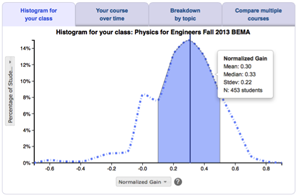
Tutorials in Thermal & Statistical Physics
Developed by: John Thompson, Michael Loverude, David Meltzer, Warren Christensen, Don Mountcastle
Level










middle schoolhigh schoolintro collegeinter-mediateupper levelgrad school other

calc based

alg based



middle schoolhigh schoolintro collegeinter-mediateupper levelgrad school other

calc based

alg based
Topics


Setting




Overview
What? Guided-inquiry worksheet activities designed to help students develop a better understanding of upper-division thermodynamics and statistical mechanics.
Student skills developed
Designed for:
- Conceptual understanding
Can be adapted for:
- Problem-solving skills
Instructor effort required
- Medium
Resources
Teaching Materials
You can download the tutorials and associated homework for free from the PhysPort Tutorials in Thermal Physics curriculum page.
Research
RESEARCH VALIDATION
This is the third highest level of research validation, corresponding to:
- at least 1 of the "based on" categories
- at least 1 of the "demonstrated to improve" categories
- at least 1 of the "studied using" categories
Research Validation Summary
Based on Research Into:
- theories of how students learn
- student ideas about specific topics
Demonstrated to Improve:
- conceptual understanding
- problem-solving skills
- lab skills
- beliefs and attitudes
- attendance
- retention of students
- success of underrepresented groups
- performance in subsequent classes
Studied using:
- cycle of research and redevelopment
- student interviews
- classroom observations
- analysis of written work
- research at multiple institutions
- research by multiple groups
- peer-reviewed publication
References
- B. Bucy, J. Thompson, and D. Mountcastle, What Is Entropy? Advanced Undergraduate Performance Comparing Ideal Gas Processes, presented at the Physics Education Research Conference 2005, Salt Lake City, Utah, 2005.
- W. Christensen, An investigation of student thinking regarding calorimetry, entropy, and the second law of thermodynamics, Ph.D., Iowa State University, 2007.
- C. Kautz, P. Heron, M. Loverude, and L. McDermott, Student understanding of the ideal gas law, Part I: A macroscopic perspective, Am. J. Phys. 73 (11), 1055 (2005).
- C. Kautz, P. Heron, P. Shaffer, and L. McDermott, Student understanding of the ideal gas law, Part II: A microscopic perspective, Am. J. Phys. 73 (11), 1064 (2005).
- M. Loverude, Student understanding of basic probability concepts in an upper-division thermal physics course, presented at the Physics Education Research Conference 2009, Ann Arbor, Michigan, 2009.
- M. Loverude, Investigating Student Understanding for a Statistical Analysis of Two Thermally Interacting Solids, presented at the Physics Education Research Conference 2010, Portland, Oregon, 2010.
- M. Loverude, They Still Remember What I Never Taught Them: Student Understanding of Entropy, presented at the Physics Education Research Conference 2012, Philadelphia, PA, 2012.
- M. Loverude, Identifying student resources in reasoning about entropy and the approach to thermal equilibrium, Phys. Rev. ST Phys. Educ. Res. 11 (2) 020118 (2015).
- M. E. Loverude, "Student Understanding of Thermal Physics," in The International Handbook of Physics Education Research: Learning Physics, edited by M. F. Tasar and P. R. L. Heron (AIP Publishing, 2023).
- M. Loverude, C. Kautz, and P. Heron, Student understanding of the first law of thermodynamics: Relating work to the adiabatic compression of an ideal gas, Am. J. Phys. 70 (2), 137 (2002).
- D. Meltzer, Student Reasoning Regarding Work, Heat, and the First Law of Thermodynamics in an Introductory Physics Course, presented at the Physics Education Research Conference 2001, Rochester, New York, 2001.
- D. Meltzer, Investigation of students' reasoning regarding heat, work, and the first law of thermodynamics in an introductory calculus-based general physics course, Am. J. Phys. 72 (11), 1432 (2004).
- D. Meltzer, Student Learning In Upper-Level Thermal Physics: Comparisons And Contrasts With Students In Introductory Courses, presented at the Physics Education Research Conference 2004, Sacramento, California, 2004.
- D. Meltzer, Observations of General Learning Patterns in an Upper-Level Thermal Physics Course, presented at the Physics Education Research Conference 2009, Ann Arbor, Michigan, 2009.
- T. Smith, W. Christensen, and J. Thompson, Student difficulties with concepts related to entropy, heat engines and the Carnot cycle, presented at the Physics Education Research Conference 2009, Ann Arbor, Michigan, 2009.
- T. I. Smith, D. B. Mountcastle, and J. R. Thompson, Student understanding of the Boltzmann factor, Phys. Rev. ST Phys. Educ. Res. 11 (2) 020123 (2015).
- T. Smith, D. Mountcastle, and J. Thompson, Identifying student difficulties with conflicting ideas in statistical mechanics, presented at the Physics Education Research Conference 2012, Philadelphia, PA, 2012.
- T. I. Smith, J. R. Thompson, and D. B. Mountcastle, Student understanding of Taylor series expansions in statistical mechanics, Phys. Rev. ST Phys. Educ. Res. 9 (2) 020110 (2013).
- T. Smith, J. Thompson, and D. Mountcastle, Addressing Student Difficulties with Statistical Mechanics: The Boltzmann Factor, presented at the Physics Education Research Conference 2010, Portland, Oregon, 2010.
- J. Thompson, B. Bucy, and D. Mountcastle, Assessing Student Understanding of Partial Derivatives in Thermodynamics, presented at the Physics Education Research Conference 2005, Salt Lake City, Utah, 2005.
- J. Thompson, C. Manogue, D. Roundy, and D. Mountcastle, Representations of partial derivatives in thermodynamics, presented at the Physics Education Research Conference 2011, Omaha, Nebraska, 2011.




